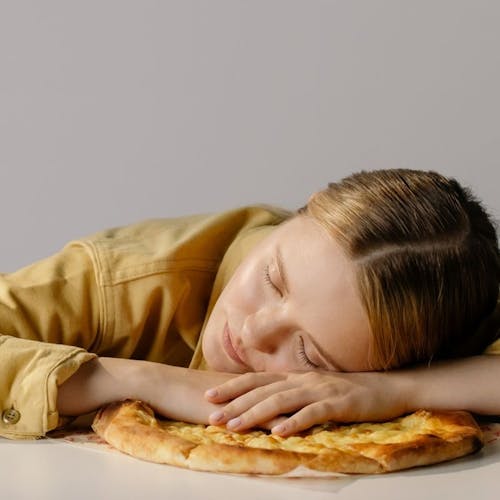This website uses cookies to enhance the user experience. By using Yoppie you are agreeing to our use of cookies.
What's This PMS Insomnia Thing?
Written by Yoppie
13 Aug 2021
Does PMS affect sleep?
How does my period impact my sleep?
Are hormones the only cause?
How do I distinguish between minor sleep issues and insomnia?
Could anything else be to blame?
How can I improve my sleep?
I’m still struggling. Where can I get help?
Fatigue and trouble sleeping are both common symptoms of PMS (premenstrual syndrome), but have you ever experienced full-on insomnia? If you have, you’re not alone. We’re looking at what PMS insomnia is, why it happens, and how to handle it. Let’s figure out how to help you catch more of those elusive Zs.
Does PMS affect sleep?
PMS can cause a whole bunch of weird and annoying symptoms, sleeping problems being one of them. In fact, those who suffer from PMS are around twice as likely to experience insomnia before their period, and possibly throughout.
Sleep problems tend to begin around 3-6 days before starting your period, and this could also be a contributor to daytime fatigue. If you’re the opposite and find that you sleep more than usual during your period, this is common, and it’s called hypersomnia.
How does my period impact my sleep?
Researchers are unsure why PMS affects sleep, but there are a number of theories, with the strongest being hormones. Hormone levels fluctuate throughout your cycle, and can cause difficulty in falling asleep, disturbances through the night, trouble achieving a deep level of sleep, and more. Studies have found that in the late luteal phase of the menstrual cycle - the PMS stage - hormones can negatively impact your sleep pattern due to the hormone progesterone causing the body temperature to raise.
Also, the hormone melatonin helps to regulate your circadian rhythm (the bodily function responsible for sleep patterns), and this can be affected by PMS. These hormones can directly impact the amount of REM (rapid eye movement) sleep you achieve in a night. This is the state that involves vivid dreams and deep sleep, so if you don’t get enough of this you may start to feel the effects.
Are hormones the only cause?
Another possible link between PMS and sleep disturbances is its ability to alter our mood drastically. If you regularly experience anxiety or depression during the PMS stage in your cycle, this can result in sleep issues like having a harder time relaxing to fall asleep. Lastly, research suggests around 14% of those with periods experience heavy bleeding each month, and when you’re dealing with changing pads during the night, or worrying that you might bleed through onto the sheets, you’re undoubtedly going to get less slumber.
How do I distinguish between minor sleep issues and insomnia?
Most people will experience the occasional sleep disturbance, and it’s pretty normal. Unfortunately those with periods may find they have it a little worse than those who don’t, with one review in 2006 finding that women are at 40% greater risk of insomnia.
Symptoms of insomnia often include heightened irritability due to exhaustion, lack of concentration and focus, and extreme fatigue - if you’re using the Epstein Sleepiness Scale, this means you could fall asleep while stopped in traffic in the car. If you experience these symptoms as a result of disturbed sleep, it’s safe to say you may be tipping over into the realms of insomnia.
Could anything else be to blame?
It’s worth noting there are a few other hormone-related issues that could be disrupting your sleep more than most. Studies have found that sleep problems may be worse for those who suffer from PMDD (Premenstrual Dysphoric Disorder), which may also bring more intense symptoms of depression, anxiety, irritability, and more. PMDD is difficult to diagnose, but around 70% of people with PMDD report sleep issues akin to insomnia before their period, while more than 80% report daily tiredness.
Similarly, those who live with PCOS (polycystic ovary syndrome) may experience worse sleep disturbances, with studies finding that those with PCOS are at higher risk of developing sleep apnea.
How can I improve my sleep?
If your sleep is being disturbed in the week leading up to your period, there are some at-home remedies you may be able to use to improve this and get more shut-eye each night:
- Hack your evening routine by going to bed early, switching off screens before bed, having a warm bath or shower, drinking some chamomile tea, and maybe even having sex! (Studies show this could help you sleep better. You’re welcome…)
- Make lifestyle changes that could improve general PMS symptoms, like cutting out excess sugar from your diet, doing gentle exercise, and drinking more water.
- It’s an obvious one, but try to cut out caffeine in the latter half of your day (or altogether if you can!) and monitor your sleep to see if it makes a difference.
- Tire yourself out each day to improve your sleep at night. This might be a HIIT class, a run, or even just a walk in the day to get rid of some energy.
- Keep the temperature in your room cool. Studies show that a cool room (not cold!) is the optimum temperature for your body to get the best chance of sleep.
I’m still struggling. Where can I get help?
If you’ve been keeping a diary of symptoms for a while and the above methods haven’t improved your sleep, it might be time to speak to your GP and get some advice on what else might help. If they can attribute your sleeping problems to PMS (keeping the diary helps with this) then they can suggest possible medication, such as hormonal birth control, to manage hormones.
Got a question about how your sleep is related to PMS symptoms? ell us about your experience and ask any questions you have in our private Facebook group or drop us a note on Insta @itsyoppie. Don't forget that our personalised period box can get organic tampons, PMS supplements and much more delivered easily and regularly through your letterbox; that's one less thing to lose sleep over!
Section jump
Back to top
Subscribe To Our Newsletter
YOPPIE





© 2026 Yoppie is a registered trademark of Phlo Technologies Ltd.
Yoppie's supplements are not a substitute for a varied diet and healthy lifestyle and are not intended to diagnose, treat, or cure any disease. If you are pregnant, breastfeeding, have a medical condition or are under medical supervision, please consult with your doctor before taking any of our products.






